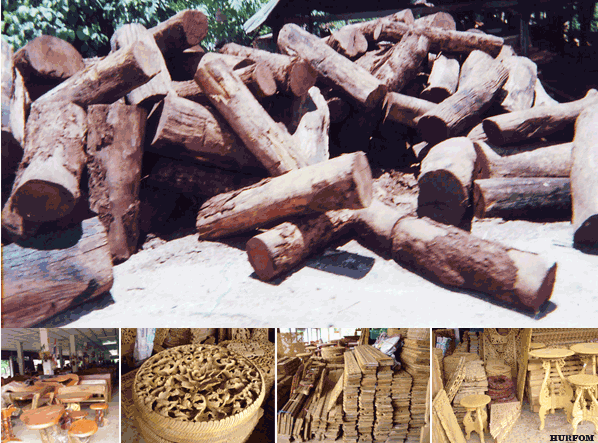Corruption enables illegal logging in Karen State
September 17, 2008

HURFOM : Corruption continues to make illegal logging possible in the Three Pagoda Pass area, on the Thai-Burma border. Competition has heated up over the last sixteen years as timber stands have declined, as have attempts to profit off the declining industry.
Although with declining activity, Three Pagodas Pass is still an important place for the manufacture and export of wood products to Thailand. Sixty truckloads of furniture and other wood products travel through Three Pagoda Pass into Thailand every month, says Nai Maut, a resident of Three Pagoda Pass who works as a logger, wood worker and truck driver. The Irrawaddy, in a recent article, reports a higher number, estimating the cross-border trade to be one hundred truckloads per month.
According to a report by XXXX, seventy-five percent of forestland in Mon and Karen states has already been logged. Access to remaining harvestable areas remains strictly controlled, and timber companies must pre-pay ethnic armed groups or the SPDC. “We pre-pay both ethnic forces like the Karen National Union (KNU) and the SPDC. If we do not pay, the KNU will seal off the forest for logging – you can only log in a place you’ve paid for,” said Nai Maut, adding, “We pay the KNU by the ton – 100,000 baht for about fifty tons of wood.” If a logging company harvests more, it pays extra. If less is cut, the KNU will refund some of the initial payment, although Nai Maut says this rarely happens.
Purchasing logging access is not, however, the only way armed groups profit off illegal logging in the area. Trucks transporting timber must pass through an extensive series of checkpoints, operated by the Democratic Karen Buddhist Army (DKBA), the Karen Peace Front (KPF), the KNU, the New Mon State Party (NMSP) and the SPDC.
“I’ve worked as a logger in Three Pagodas Pass since 1992, and know a lot about corruption in armed ethnic groups and the army. We have to pay a different amount at each checkpoint, depending on the type and amount of timber we are transporting. We have to pass through six or seven checkpoints to get from the forest to Three Pagoda pass, and each time they charge per vehicle – a four wheeled car costs between 500 to 1,000 baht, a ten wheel truck between 3,000 to 5,000 baht,” said Nai Nyunt, a logger from the area. KNU checkpoints charge by the ton, and the type of timber; one ton of ironwood costs 2,000 baht, a ton of teak 7,000.
“We have to pay the authorities and armed groups at small check-points run by the DKBA, the KPF and SPDC authorities like police, metro police, people’s militia forces and other kinds authorities founded by military regime. From Chaung Zone to Three Pagodas Pass, we have to pass through fourteen gates, each charging between 1,000 to 1,500 baht per ten wheeled truck and 500 to 700 baht per four wheeled car,” said Nai Maut.
From Magata, fifteen kilometres from Three Pagodas Pass, a single ten-wheeled truck of hard wood must pay 10,000 to 15,000 baht to the army, KPF and DKBA each, as well as 3,500 baht per tone of teak and 2,000 to 3,000 baht per ton of ironwood to the KNU. These fees are not set in stone, said the loggers, and depend on who is working the checkpoints.
The NMSP, however, cannot levy taxes on timber from Magata because it does not control the area, and would risk conflict with Karen groups. Though not explicitly about logging, district level NMSP and KPF authorities disagreed about territorial claims as recently as two years ago, and the NMSP and KNU engaged in armed clashes over control of Three Pagodas Pass in 1989. The NMSP can now only tax logging in the Chaung Zone area, seven kilometres from Three Pagodas Pass, where there are few remaining stands of teak and ironwood. Other tree species remain, and the NMSP is able to levy taxes of 700 to 2,000 baht per ton.
Timber harvested from the Three Pagodas Pass area is processed into furniture and other wood products, and exported to Thailand. In order to cross the border, Thad Zin Tun, commander of Light Infantry battalion No. 20, must be paid 35,000 to 55,000 baht per ten-wheeled truck. This nets him a monthly income of thirteen million baht, a small fortune in a place where the average income hovers around twenty five hundred baht. Officially, the border has been closed since the DKBA abducted two Thai policemen in 2006.
Though logging activity as declined in the Thai-Burma border area, elsewhere in Burma timber continues to be extracted at an astonishing rate. Global Witness, an international NGO focused on natural resource exploitation in conflict, estimates that timber is the SPDC’s second largest source of foreign exchange, and growing. Though officially restricted by the Forest Law of 1992, trade in forest products netted the SPDC $427.81 million USD in 2004-2005 alone.
—————————————————————————–
Weng, Lawi. “Illegal Timber Crossing Thai-Burmese Border,” The Irrawaddy News, 5 Sep 2008
Global Witness. “A Choice For China: Ending the destruction of Burma’s northern frontier forests,” Briefing Document, October 2005
Gutter, Peter. “Environment and Law in Burma,” Legal Issues on Burma Journal No. 9, August 2001.
—————————————————————————–
Comments
Got something to say?
You must be logged in to post a comment.



















































